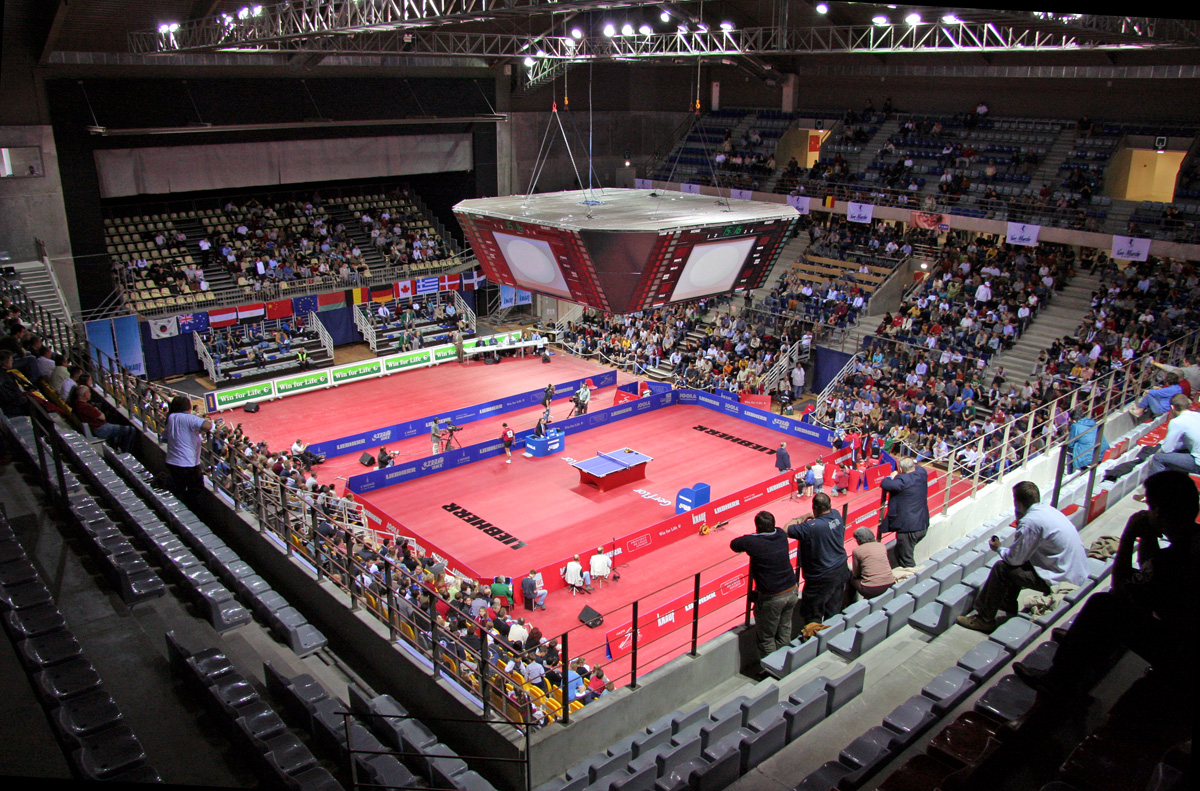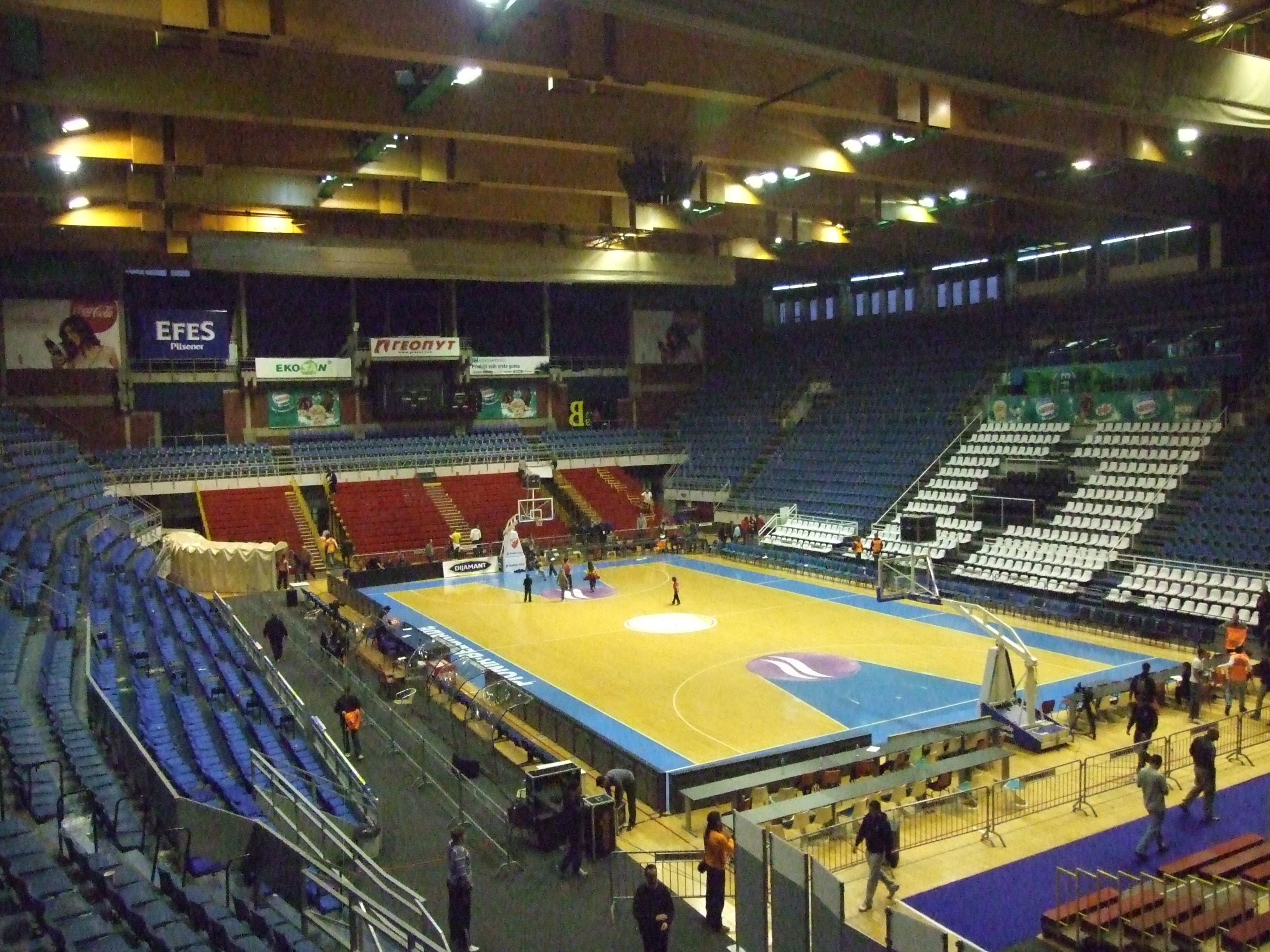|
Vinko Jelovac
Vinko Jelovac (alternate spelling: Vinto Jelovac) (born 18 November 1948 in Pazin, SR Croatia, Yugoslavia) is a former Slovenian-Croatian professional basketball player and coach. At a height of 2.08 m (6'10") tall, and a weight of 95 kg (210 lbs.), he played at the center position. Jelovac was named Slovenian Sportsman of the Year, in 1973 and 1974. He was inducted into the Slovenian Athletes Hall of Fame, in 2012. Club career During his club career, Jelovac was a long-time player of KK Olimpija. He was a member of the FIBA European Selection, in 1973 and 1974. He won the Yugoslav League championship in 1970. National team career Jelovac competed at the 1972 Summer Olympics, and the 1976 Summer Olympics, with the senior men's Yugoslav national basketball team. He also competed at the FIBA World Cup The FIBA Basketball World Cup, also known as the FIBA World Cup of Basketball or simply the FIBA World Cup, between 1950 and 2010 known as the FIBA World Championship, is an inter ... [...More Info...] [...Related Items...] OR: [Wikipedia] [Google] [Baidu] |
Pazin
Pazin ( it, Pisino, german: Mitterburg) is a town in western Croatia, the administrative seat of Istria County. It is known for the medieval Pazin Castle, the former residence of the Istrian margraves. Geography The town had a population of 8,638 in 2011, of which 4,386 lived in the urban settlement. In 1991 it was made the capital of the county for its location in the geographical centre of the Istrian peninsula and in order to boost the development of its interior territories. History Pazin was first mentioned as ''Castrum Pisinum'' in a 983 deed regarding a donation by Emperor Otto II to the Diocese of Poreč.Naklada Naprijed, ''The Croatian Adriatic Tourist Guide'', pg. 27, Zagreb (1999), It then belonged to the Imperial March of Istria, which had originally been under the suzerainty of the newly established Duchy of Carinthia in 976, but separated together with the March of Carniola in 1040. In the 12th century Mitterburg Castle was in possession of the Lower Carniolan ... [...More Info...] [...Related Items...] OR: [Wikipedia] [Google] [Baidu] |
1974 FIBA World Championship
The 1974 FIBA World Championship was the 7th FIBA World Championship, the international basketball world championship for men's teams. It was hosted by Puerto Rico from July 3 to 14, 1974. The tournament was won by the Soviet Union. Venues Competing nations Preliminary round Group A Group B Group C Classification round Final round Awards Final rankings All-Tournament Team * Alexander Belov * Vinko Jelovac * Wayne Brabender * Alejandro Urgelles * Alexander Salnikov Top scorers (ppg) # Arturo Guerrero (Mexico) 27.0 # Manuel Raga (Mexico) 26.1 # Eddie Palubinskas (Australia) 24.8 # Wayne Brabender (Spain) 23.0 # Ernesto Gehrmann (Argentina) 22.3 # Luther Burden (United States) 20.2 # John Lucas (United States) 20.2 # Dragan Kićanović (Yugoslavia) 19.8 # Alejandro Urgelles (Cuba) 19.3 # William Adornado (Philippines) 18.0 References External links * * {{DEFAULTSORT:FIBA 1974 ... [...More Info...] [...Related Items...] OR: [Wikipedia] [Google] [Baidu] |
Basketball Coach
Basketball coaching is the act of directing and strategizing the behavior of a basketball team or individual basketball player. Basketball coaching typically encompasses the improvement of individual and team offensive and defensive skills, as well as overall physical conditioning. Coaches also have the responsibility to improve their team by player development, strategy, and in-game management. Coaches also teach and inspire their team to be their best. Coaching is usually performed by a single person, often with the help of one or more assistants. Coaching tools A dry erase clipboard or tablet computer with a basketball court outline is often used mid-game to describe plays and provide an overview of the strategy of the opposing team. Coaches strategize and scout opposing teams and find ways to defeat them as easily as possible. At the same time, they overlook their own personal team to start the best five players (only five players can be on floor at one time). Coaches, also, ... [...More Info...] [...Related Items...] OR: [Wikipedia] [Google] [Baidu] |
Basketball
Basketball is a team sport in which two teams, most commonly of five players each, opposing one another on a rectangular Basketball court, court, compete with the primary objective of #Shooting, shooting a basketball (ball), basketball (approximately in diameter) through the defender's hoop (a basket in diameter mounted high to a Backboard (basketball), backboard at each end of the court, while preventing the opposing team from shooting through their own hoop. A Field goal (basketball), field goal is worth two points, unless made from behind the 3 point line, three-point line, when it is worth three. After a foul, timed play stops and the player fouled or designated to shoot a technical foul is given one, two or three one-point free throws. The team with the most points at the end of the game wins, but if regulation play expires with the score tied, an additional period of play (Overtime (sports), overtime) is mandated. Players advance the ball by bouncing it while walking ... [...More Info...] [...Related Items...] OR: [Wikipedia] [Google] [Baidu] |
Yugoslavia Men's National Under-18 Basketball Team
The Yugoslavia men's national under-18 basketball team ( sh, Juniorska košarkaška reprezentacija Jugoslavije) was the boys' basketball team, administered by Basketball Federation of Yugoslavia, that represented SFR Yugoslavia in international under-18 (under age 18) men's basketball competitions, consisted mainly of the European Championship for Juniors, nowadays known as the FIBA Europe Under-18 Championship. After the dissolution of SFR Yugoslavia in 1991, the successor countries all set up their own national under-18 teams. Serbia and Croatia teams won the Championship for three times each, as of 2017. Several team members have been inducted into the FIBA Hall of Fame, including players Krešimir Ćosić, Mirza Delibašić, Zoran Slavnić, Dragan Kićanović, Vlade Divac, Jure Zdovc, Toni Kukoč, Dražen Petrović, and coaches Ranko Žeravica, Bogdan Tanjević, Mirko Novosel, Dušan Ivković, and Svetislav Pešić. Also, Dino Rađa, Divac, Petrović, Kuko� ... [...More Info...] [...Related Items...] OR: [Wikipedia] [Google] [Baidu] |
1968 FIBA Europe Under-18 Championship
The 1968 FIBA Europe Under-18 Championship was an international basketball competition held in Vigo, Spain , image_flag = Bandera de España.svg , image_coat = Escudo de España (mazonado).svg , national_motto = ''Plus ultra'' (Latin)(English: "Further Beyond") , national_anthem = (English: "Royal March") , i ... in 1968. Final ranking 1. 2. 3. 4. 5. 6. 7. 8. 9. 10. 11. 12. Awards External linksFIBA Archive{{International youth basketball Under-18 Under-18 1968 FIBA U18 European Championship ... [...More Info...] [...Related Items...] OR: [Wikipedia] [Google] [Baidu] |
FIBA Europe Under-18 Championship
The FIBA U18 European Championship, originally known as the European Championship for Juniors, is a youth men's basketball competition that was inaugurated with the 1964 edition. It was held biennially through the 2002 edition. From the 2004 edition onward, it has been held every year. It serves as the qualification tournament for the FIBA Under-19 World Cup, for the FIBA Europe region. The current champions are Spain. Division A Results Medal table *Source: *1 Since 1992, Czechoslovakia, the Soviet Union and Yugoslavia are defunct. *2 FR Yugoslavia was formed in 1992 and renamed to Serbia and Montenegro in 2003. As of 2006, Serbia and Montenegro is defunct. *3 Commonwealth of Independent States (CIS) competed only in 1992. Participating nations : As FR Yugoslavia (1992–2002, 2 participations, 1 medal) and as Serbia and Montenegro (2003–2006, 3 participations, 1 medal) MVP Awards (since 1998) Division B Results * Since 2012, the 3rd team in Division B is als ... [...More Info...] [...Related Items...] OR: [Wikipedia] [Google] [Baidu] |
1971 Mediterranean Games
The 1971 Mediterranean Games, officially known as the VI Mediterranean Games, and commonly known as Izmir 1971, were the 6th Mediterranean Games. The Games were held in İzmir, Turkey, from 6 to 17 October 1971, where 1,362 athletes (1,235 men and 127 women) from 15 countries participated. There were a total of 137 medal events from 17 different sports. Participating nations * (38) * (109) * (50) * (159) * (162) * (2) * (36) * (11) * (76) * (148) * (108) * (83) * (219) * (161) Sports * * * * * * * * * * * * * * * * * Medal table References Serbian Olympic Committee See alsoInternational Mediterranean Games Committee {{DEFAULTSORT:Mediterranean Games,1971 |
Basketball At The Mediterranean Games
Basketball has been played consistently at the Mediterranean Games since the year 1951 for men and since the year 1987 for women. The Yugoslavia national basketball team The Yugoslavia men's national basketball team ( sh-Latn-Cyrl, separator=" / ", Košarkaška reprezentacija Jugoslavije, Кошаркашка репрезентација Југославије; sl, Jugoslovanska košarkarska reprezentanca; mk, ... was the most successful men's team and the Croatian women's national basketball team is the most successful team for women. Men's tournaments 3x3 Basketball men's tournament Men's medal table Women's tournaments 3x3 Basketball women's tournament Women's medal table All-time medal table ''Updated with 2022 results.'' See also * Basketball at the Summer Olympics * Basketball at the Summer Universiade References External linksHellenic Basketball Federation Men's Mediterranean Games medals table [...More Info...] [...Related Items...] OR: [Wikipedia] [Google] [Baidu] |
EuroBasket 1977
The 1977 FIBA European Championship, commonly called FIBA EuroBasket 1977, was the twentieth FIBA EuroBasket regional basketball championship, held by FIBA Europe. Venues Group stage Group A – Liège Group B – Ostend Knockout stage 5th to 8th place 9th to 12th place Final standings # # # # # # # # # # # # Awards Team rosters 1. Yugoslavia: Krešimir Ćosić, Dražen Dalipagić, Mirza Delibašić, Dragan Kićanović, Zoran Slavnić, Žarko Varajić, Željko Jerkov, Vinko Jelovac, Ratko Radovanović, Duje Krstulović, Ante Đogić, Joško Papič (Coach: Aleksandar Nikolić) 2. Soviet Union: Sergei Belov, Anatoly Myshkin, Vladimir Tkachenko, Aleksander Belostenny, Stanislav Eremin, Mikheil Korkia, Valeri Miloserdov, Vladimir Zhigili, Aleksander Salnikov, Viktor Petrakov, Vladimir Arzamaskov, Aleksander Kharchenkov (Coach: Alexander Gomelsky) 3. Czechoslovakia: Kamil Brabenec, Stanislav Kropilak, Zdenek Kos, Jiri Pospisil ... [...More Info...] [...Related Items...] OR: [Wikipedia] [Google] [Baidu] |
EuroBasket 1975
The 1975 FIBA European Championship, commonly called FIBA EuroBasket 1975, was the nineteenth FIBA EuroBasket regional basketball championship, held by FIBA Europe. Venues First round Group A – Split Group B – Karlovac Group C – Rijeka Second round Places 7 – 12 Places 1 – 6 in Belgrade Final standings # # # # # # # # # # # # Awards Team rosters 1. Yugoslavia: Krešimir Ćosić, Dražen Dalipagić, Mirza Delibašić, Dragan Kićanović, Zoran Slavnić, Nikola Plećaš, Željko Jerkov, Vinko Jelovac, Damir Šolman, Rato Tvrdić, Rajko Žižić, Dragan Kapičić (Coach: Mirko Novosel) 2. Soviet Union: Sergei Belov, Alexander Belov, Ivan Edeshko, Alzhan Zharmukhamedov, Mikheil Korkia, Aleksander Sidjakin, Valeri Miloserdov, Yuri Pavlov, Aleksander Boloshev, Aleksander Salnikov, Vladimir Zhigili, Aleksander Bolshakov (Coach: Vladimir Kondrashin) 3. Italy: Dino Meneghin, Pierluigi Marzorati, Carlo Recalcati, Renzo Barivie ... [...More Info...] [...Related Items...] OR: [Wikipedia] [Google] [Baidu] |
EuroBasket 1973
The 1973 FIBA European Championship, commonly called FIBA EuroBasket 1973, was the eighteenth FIBA EuroBasket regional basketball championship, held by FIBA Europe. Venues Group stage Group A – Badalona Group B – Barcelona Knockout stage 5th to 8th place 9th to 12th place Final standings # # # # # # # # # # # # Awards Team rosters 1. Yugoslavia: Krešimir Ćosić, Dražen Dalipagić, Dragan Kićanović, Zoran Slavnić, Nikola Plećaš, Željko Jerkov, Vinko Jelovac, Damir Šolman, Rato Tvrdić, Milun Marović, Žarko Knežević, Dragi Ivković (Coach: Mirko Novosel) 2. Spain: Clifford Luyk, Wayne Brabender, Francisco "Nino" Buscato, Vicente Ramos, Rafael Rullan, Manuel Flores, Luis Miguel Santillana, Carmelo Cabrera, Gonzalo Sagi-Vela, Jose Luis Sagi-Vela, Miguel Angel Estrada, Enrique Margall (Coach: Antonio Díaz-Miguel) 3. Soviet Union: Sergei Belov, Modestas Paulauskas, Anatoly Myshkin, Ivan Edeshko, Zurab Sakandelidze, Sergei K ... [...More Info...] [...Related Items...] OR: [Wikipedia] [Google] [Baidu] |



.jpg)